
Social Desirability Bias
Principal Category: Cognitive Biases
Authors:
• Tim McGuinness, Ph.D., DFin, MCPO, MAnth – Anthropologist, Scientist, Polymath, Director of the Society of Citizens Against Relationship Scams Inc.
Social desirability bias is a common psychological pattern where individuals alter their words, behaviors, or self-reports to appear more acceptable, likable, or morally good in the eyes of others. This bias often operates unconsciously, causing people to present a polished version of themselves while hiding vulnerabilities or mistakes. For scam victims, social desirability bias creates additional barriers to recovery. It leads many to downplay the extent of their losses, pretend they are further along in healing, or avoid discussing lingering fears and confusion. This bias also interferes with honesty in support groups and therapy, where victims may say what sounds good instead of sharing what feels true. Overcoming this tendency requires self-awareness, reflection, and a willingness to prioritize authenticity over social approval. By recognizing this bias, scam victims can engage more fully in real healing, rebuild self-trust, and reconnect with life in a genuine and meaningful way.

Social Desirability Bias: How It Affects Thinking, Choices, and Scam Recovery
Understanding Social Desirability Bias
Social desirability bias is a common psychological pattern where individuals say or do things not because those actions reflect their true beliefs, but because they want to appear acceptable, likable, or morally good in the eyes of others. This bias often leads people to distort their thoughts, behaviors, or accounts of events to match what they believe society expects. For most people, this happens automatically. They are not always aware when it is happening.
At its core, social desirability bias is about reputation management. Human beings are social creatures who depend on groups for survival and emotional support. Because of this, they naturally develop a tendency to present the best version of themselves to the world. They want to be seen as kind, intelligent, ethical, and competent. The problem begins when this bias prevents individuals from facing reality or from making honest choices that reflect their actual experiences or needs.
How Social Desirability Bias Works
Social desirability bias operates at both conscious and unconscious levels. Sometimes people know exactly why they are saying something. They may exaggerate their generosity, downplay their mistakes, or agree with popular opinions to avoid conflict. Other times, they do not realize they are doing it. The mind simply adjusts behavior or words automatically to match what will gain approval.
For example, if someone asks how often a person exercises, the answer might be, “I try to go to the gym several times a week,” even if that is not true. People say this because it sounds better and fits social expectations. They might claim they never fall for marketing tricks or that they always read the fine print, even though that is rarely the case. These small lies may seem harmless in daily life, but they can create serious problems when they interfere with self-awareness, decision-making, or relationships.
Social desirability bias also influences how people answer surveys, participate in group discussions, or share stories about their lives. Individuals tend to emphasize actions that make them look responsible or ethical. They downplay actions that might make them appear careless or unwise. They want to be seen as the person who makes good choices, even when reality is more complicated.
The Role of Shame and Fear
This bias is closely tied to feelings of shame and fear of rejection. Many people believe that telling the full truth will lead to social judgment. They might think, “If people knew the real me, they would think less of me.” That thought drives them to protect their social image, even at the cost of honesty.
The problem is that social desirability bias can lock individuals into a cycle of denial. When people focus too much on how they appear to others, they stop being honest with themselves. They avoid confronting difficult truths because they worry about how those truths might change how others see them. Over time, this creates emotional distance between who they really are and who they pretend to be. That distance can become exhausting and harmful.
Social Desirability Bias and Scam Victims
For scam victims, social desirability bias can make recovery much more difficult. This happens in several ways. Victims may find themselves reluctant to admit the full extent of what happened. They might tell a version of the story that makes them sound smarter or more cautious than they actually were during the scam. They may leave out details that feel embarrassing or downplay how much money they lost and how long the scam lasted. This is not because they are dishonest. It is because they want to protect their social image. They fear being seen as gullible, foolish, or weak.
Victims may also pretend they are further along in their recovery than they actually are. When friends, support groups, or therapists ask how things are going, victims might say, “I am doing fine, I have moved past it,” even if they are still struggling. They do this because they do not want people to think they are stuck or broken. They do not want to appear needy or fragile. Unfortunately, this closes the door to real help and keeps them isolated.
Another way social desirability bias affects scam victims is by influencing how they talk about trust and vulnerability. After a scam, victims may say, “I will never trust anyone again,” because it feels like the right thing to say. It sounds strong and protective. In reality, they may still crave connection and trust, but they do not want to admit it. They worry that people will think they are setting themselves up to be hurt again. This creates a tension between their real needs and the persona they present to others.
The Bias in Support Groups and Therapy
Support groups and therapy spaces are designed to help people heal, but social desirability bias can interfere there as well. When victims share their stories in these environments, they might unconsciously edit the details to match what they think is expected. They might say what sounds good instead of what feels true. This prevents them from getting the full benefit of support.
For example, a victim might claim, “I learned my lesson, and I know exactly what to look for now,” even though they still feel confused and vulnerable. They say this because they think that is what recovery is supposed to sound like. They may express anger instead of grief because anger feels socially acceptable, while grief feels like weakness. This limits emotional growth and keeps them locked in patterns of self-protection instead of healing.
How to Overcome Social Desirability Bias
The first step in overcoming social desirability bias is to notice it. Individuals need to ask themselves honest questions:
- Am I saying this because it is true, or because it makes me look better?
- Am I hiding parts of my experience because I am afraid of judgment?
- Am I pretending to be more healed or more in control than I really am?
When people catch themselves doing this, they can pause and reflect. Real growth comes from honesty, not from appearances. People do not have to share everything with everyone, but they need to be truthful with themselves and with the people who are helping them recover.
It helps to practice saying things like, “I am still learning how to process this,” or “I do not have all the answers yet.” These statements keep individuals grounded. They show strength, not weakness, because they reflect reality without pretending.
Writing can also be a useful tool for practicing honesty. In a private journal, people can write down the full truth of their thoughts and feelings without worrying about how they sound. This helps them become more comfortable with the messy parts of their experience. Over time, this practice reduces the grip of social desirability bias on the mind.
Final Thoughts
Social desirability bias is part of being human. People want to be seen in a good light, especially after something painful or embarrassing like a scam. However, real recovery requires moving beyond appearances. When victims recognize this bias in themselves, they gain the freedom to speak the truth, ask for help, and rebuild their lives honestly. This is how real safety and lasting healing happen—not by looking good, but by becoming stronger through authenticity.
IMPORTANT NOTE: This article is intended to be an introductory overview of complex psychological, neurological, physiological, or other concepts, written primarily to help victims of crime understand the wide-ranging actual or potential effects of psychological trauma they may be experiencing. The goal is to provide clarity and validation for the confusing and often overwhelming symptoms that can follow a traumatic event. It is critical to understand that this content is for informational purposes only and does not constitute or is not a substitute for professional medical advice, diagnosis, or treatment. If you are experiencing distress or believe you are suffering from trauma or its effects, it is essential to consult with a qualified mental health professional for personalized care and support.

Welcome to the SCARS INSTITUTE Journal of Scam Psychology
A Journal of Applied Scam, Fraud, and Cybercrime Psychology – and Allied Sciences
A dedicated site for psychology, victimology, criminology, applied sociology and anthropology, and allied sciences, published by the SCARS INSTITUTE™ – Society of Citizens Against Relationship Scams Inc.
TABLE OF CONTENTS
A Question of Trust
At the SCARS Institute, we invite you to do your own research on the topics we speak about and publish, Our team investigates the subject being discussed, especially when it comes to understanding the scam victims-survivors experience. You can do Google searches but in many cases, you will have to wade through scientific papers and studies. However, remember that biases and perspectives matter and influence the outcome. Regardless, we encourage you to explore these topics as thoroughly as you can for your own awareness.
Please Leave A Comment
Recent Comments
On Other Articles
[better_recent_comments number=”5″ format=”{avatar} on {post}: “{comment}” {date}” avatar_size=”20″]
A Note About Labeling!
We often use the term ‘scam victim’ in our articles, but this is a convenience to help those searching for information in search engines like Google. It is just a convenience and has no deeper meaning. If you have come through such an experience, YOU are a Survivor! It was not your fault. You are not alone! Axios!
Statement About Victim Blaming
Some of our articles discuss various aspects of victims. This is both about better understanding victims (the science of victimology) and their behaviors and psychology. This helps us to educate victims/survivors about why these crimes happened and to not blame themselves, better develop recovery programs, and to help victims avoid scams in the future. At times this may sound like blaming the victim, but it does not blame scam victims, we are simply explaining the hows and whys of the experience victims have.
These articles, about the Psychology of Scams or Victim Psychology – meaning that all humans have psychological or cognitive characteristics in common that can either be exploited or work against us – help us all to understand the unique challenges victims face before, during, and after scams, fraud, or cybercrimes. These sometimes talk about some of the vulnerabilities the scammers exploit. Victims rarely have control of them or are even aware of them, until something like a scam happens and then they can learn how their mind works and how to overcome these mechanisms.
Articles like these help victims and others understand these processes and how to help prevent them from being exploited again or to help them recover more easily by understanding their post-scam behaviors. Learn more about the Psychology of Scams at www.ScamPsychology.org
Psychology Disclaimer:
All articles about psychology, neurology, and the human brain on this website are for information & education only
The information provided in these articles is intended for educational and self-help purposes only and should not be construed as a substitute for professional therapy or counseling.
While any self-help techniques outlined herein may be beneficial for scam victims seeking to recover from their experience and move towards recovery, it is important to consult with a qualified mental health professional before initiating any course of action. Each individual’s experience and needs are unique, and what works for one person may not be suitable for another.
Additionally, any approach may not be appropriate for individuals with certain pre-existing mental health conditions or trauma histories. It is advisable to seek guidance from a licensed therapist or counselor who can provide personalized support, guidance, and treatment tailored to your specific needs.
If you are experiencing significant distress or emotional difficulties related to a scam or other traumatic event, please consult your doctor or mental health provider for appropriate care and support.
Also, please read our SCARS Institute Statement About Professional Care for Scam Victims – here
If you are in crisis, feeling desperate, or in despair please call 988 or your local crisis hotline.
SCARS Institute Resources:
- If you are a victim of scams, go to www.ScamVictimsSupport.org for real knowledge and help
- Enroll in SCARS Scam Survivor’s School now at www.SCARSeducation.org
- To report criminals, visit reporting.AgainstScams.org – we will NEVER give your data to money recovery companies like some do!
- Sign up for our free support & recovery help at www.SCARScommunity.org
- Follow us and find our podcasts, webinars, and helpful videos on YouTube: www.youtube.com/@RomancescamsNowcom
- SCARS Institute Songs for Victim-Survivors: www.youtube.com/playlist…
- Learn about the Psychology of Scams at www.ScamPsychology.org
- Dig deeper into the reality of scams, fraud, and cybercrime at www.ScamsNOW.com and www.RomanceScamsNOW.com
- Scam Survivor’s Stories: www.ScamSurvivorStories.org
- For Scam Victim Advocates, visit www.ScamVictimsAdvocates.org
- See more scammer photos on www.ScammerPhotos.com


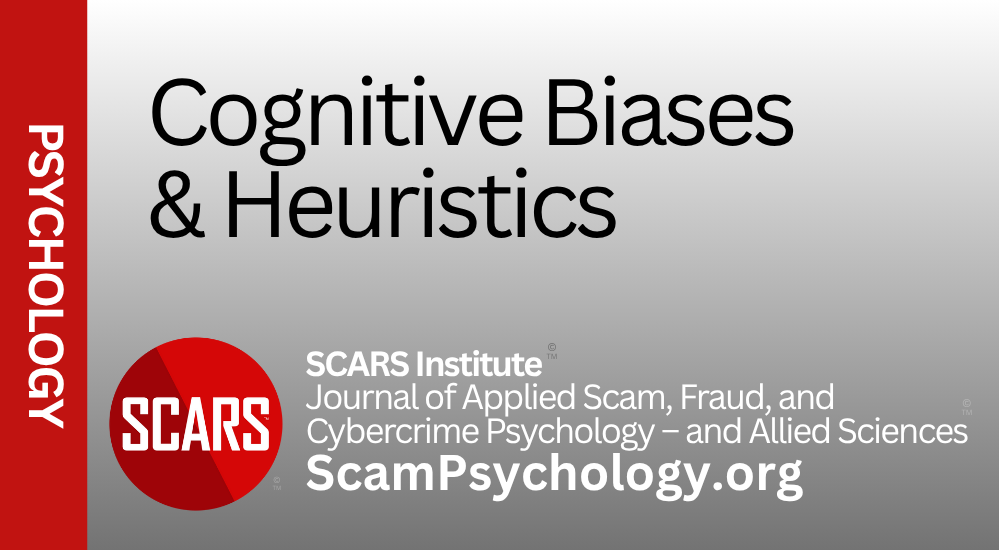
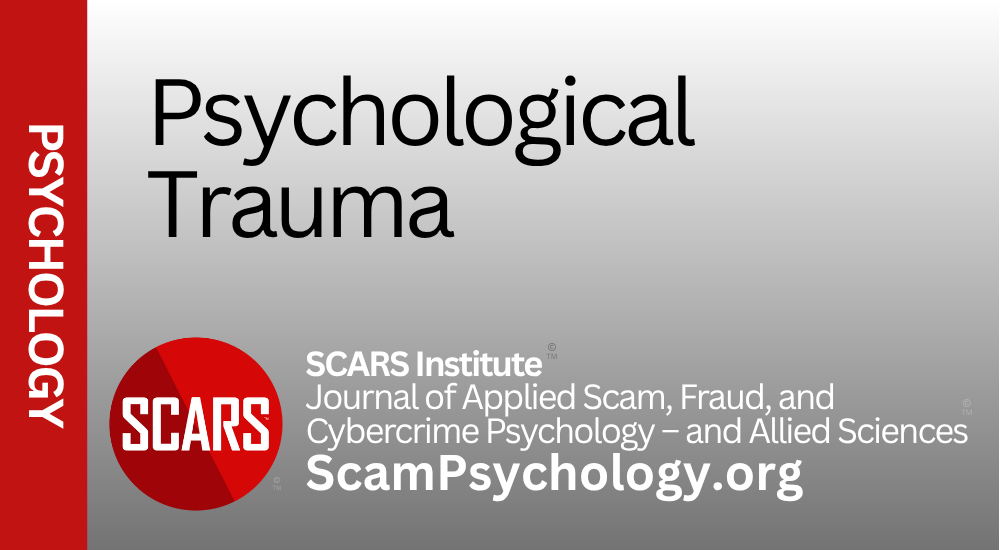
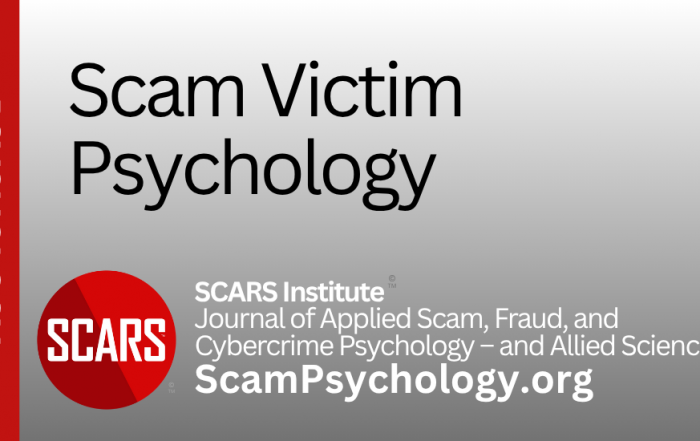
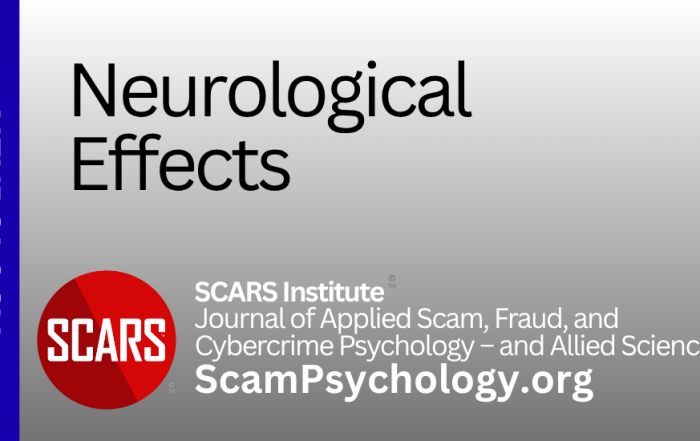

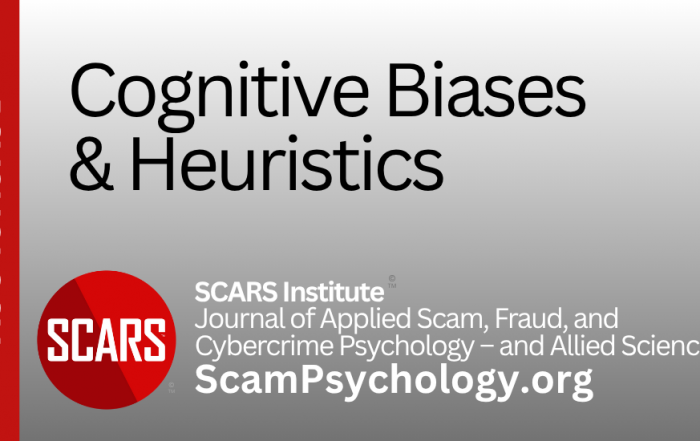
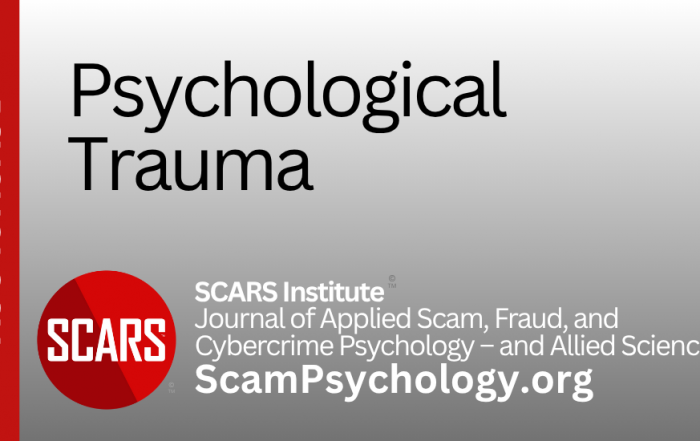

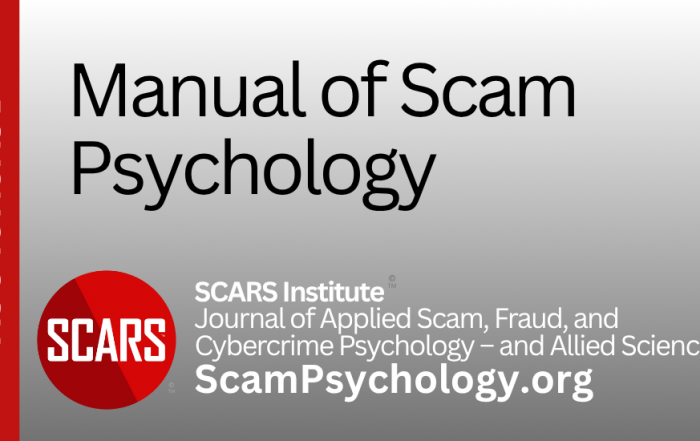

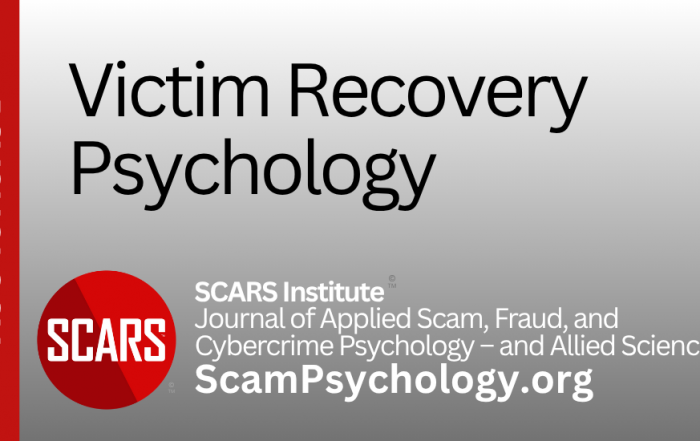

![niprc1.png1_-150×1501-11[1]](https://scampsychology.org/wp-content/uploads/2025/05/niprc1.png1_-150x1501-111.webp)